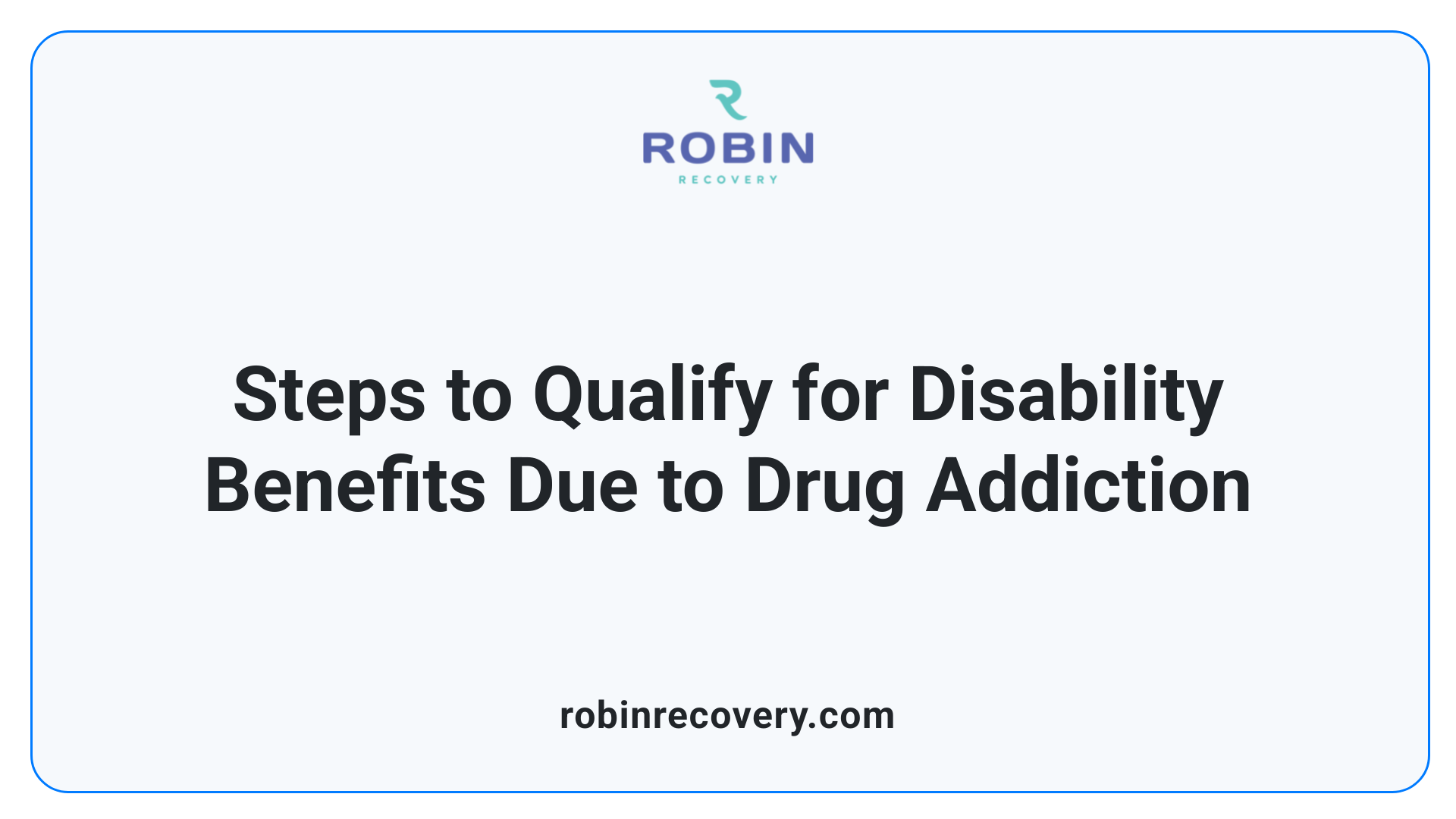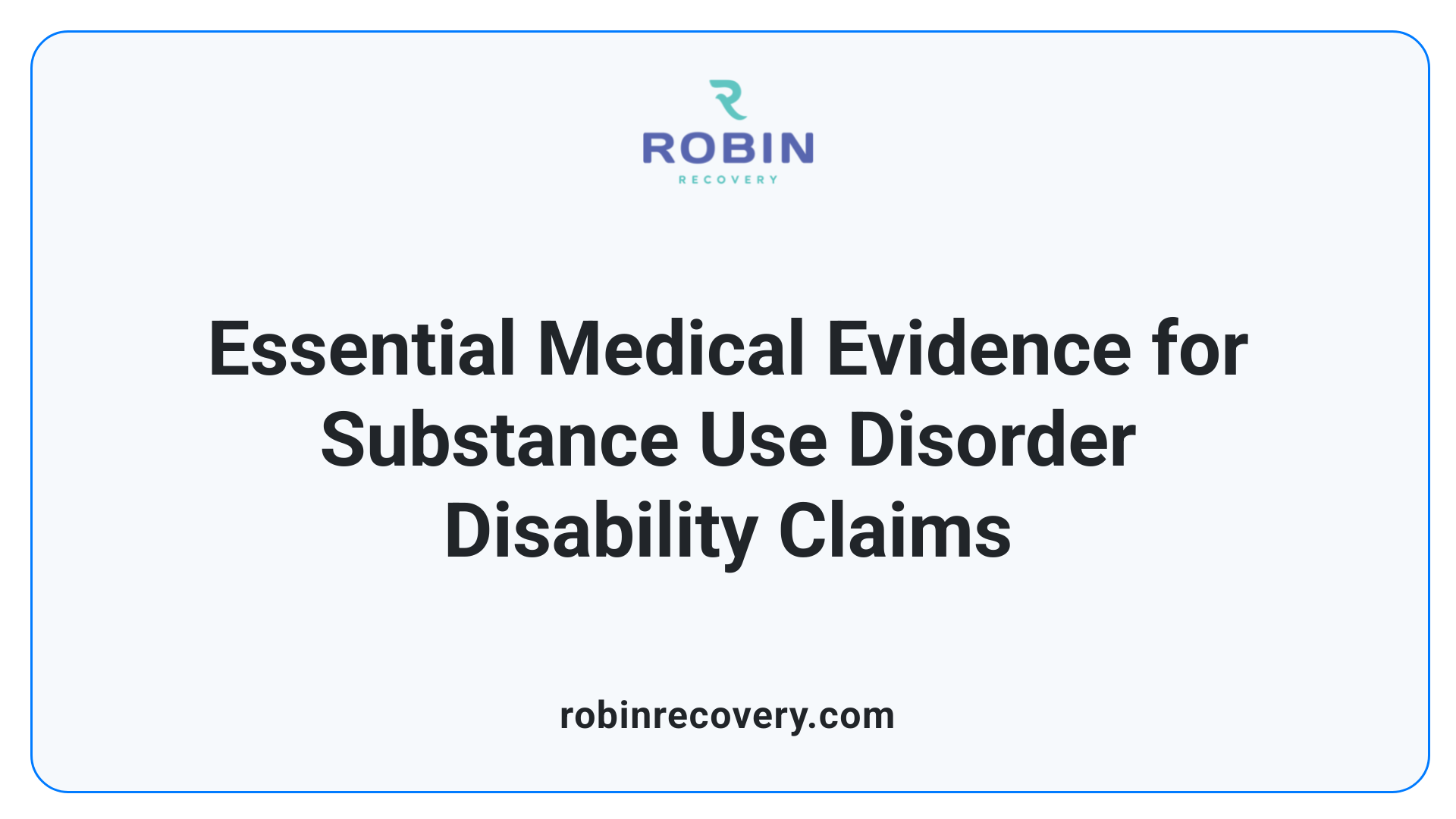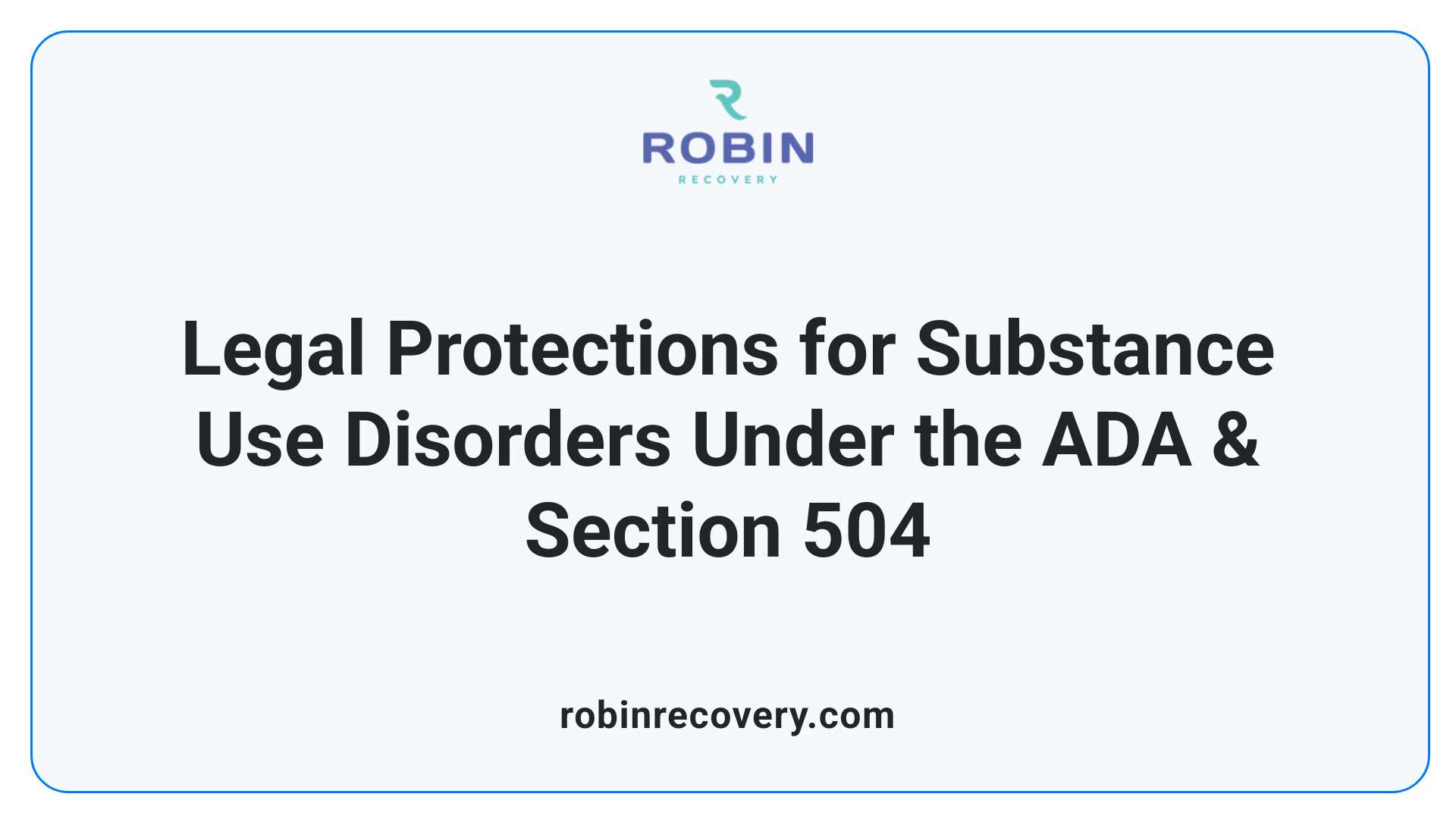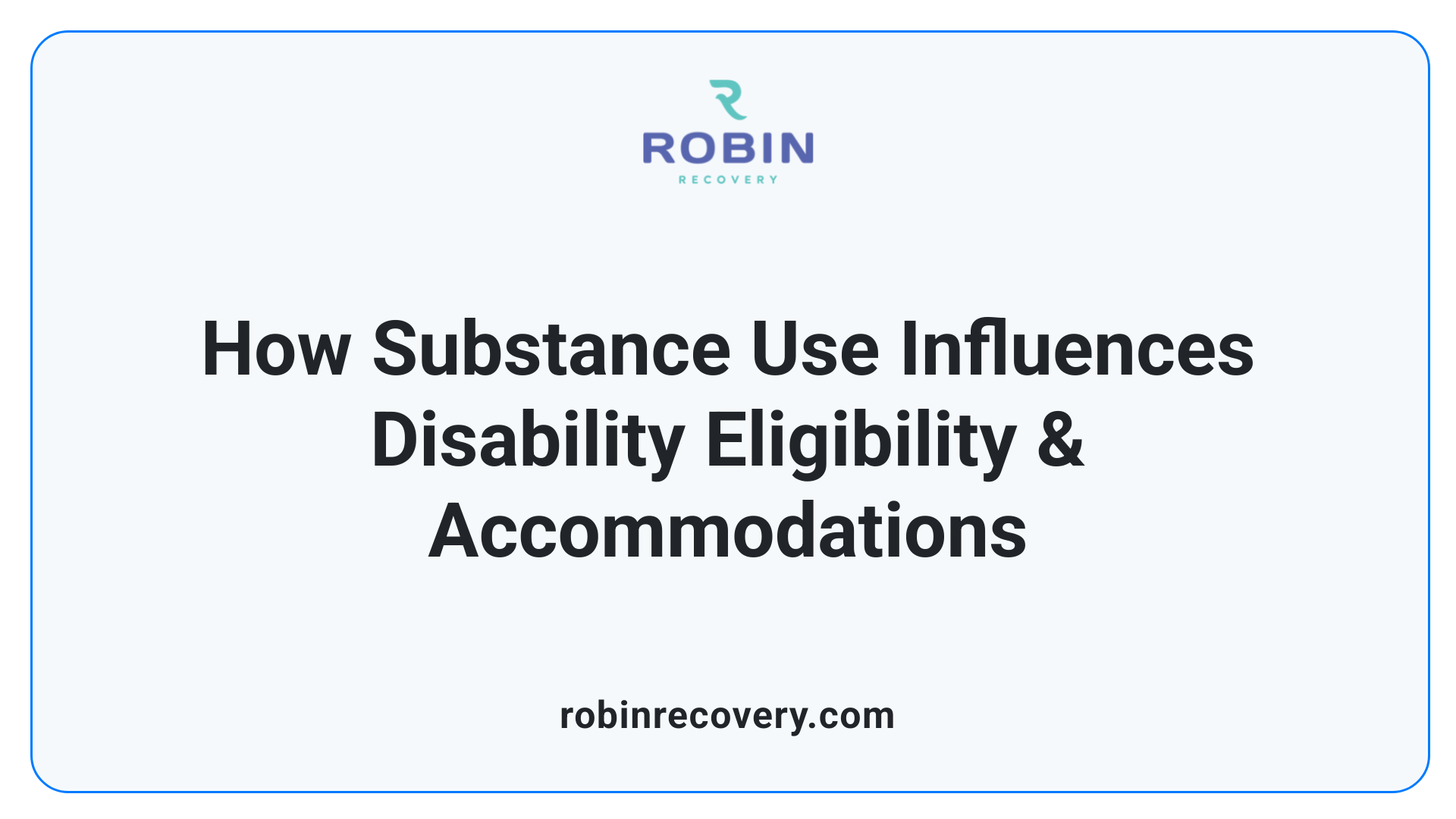How to Get Disability for Drug Addiction

Understanding the Intersection of Drug Addiction and Disability Claims
Drug addiction is a chronic disease that affects millions of individuals worldwide and can significantly impair functioning and employment capabilities. While the recognition of addiction as a disability is complex, legal frameworks such as the ADA and SSA policies provide pathways for individuals affected by substance use disorders to seek benefits and protections. This article explores how drug addiction influences disability eligibility, the legal considerations involved, and the process for obtaining benefits.
Legal Recognition and Protections for Substance Use Disorders
Is drug addiction recognized as a disability legally?
Drug addiction itself is not classified as a disability under federal law. However, impairments that result from substance abuse—such as mental health conditions, organ damage, or neurological impairments—can be considered disabilities. The Americans with Disabilities Act (ADA), along with Section 504 of the Rehabilitation Act, recognizes substance use disorders as disabilities in certain contexts.
Currently, the ADA does not protect individuals who are actively using illegal drugs without seeking treatment or recovery. However, it does offer protections for individuals who are in recovery or have disabilities linked to past drug addiction or alcoholism.
Alcoholism, in particular, is widely acknowledged as a disability under the ADA. This recognition allows individuals with alcoholism to receive legal protections and reasonable accommodations in the workplace, such as flexible work hours for treatment or restructuring tasks.
Substance use disorders are considered disabilities under laws like Section 504 and the ADA, provided there is a formal diagnosis and the impairments, such as neurological or mental health issues, persist beyond the cessation of substance use. Nonetheless, ongoing illegal drug use disqualifies an individual from receiving these protections.
It is important to note that for disability benefits through programs like SSA, a person cannot receive benefits solely based on drug addiction or alcoholism. The law emphasizes that the addiction must not be the primary contributing factor to the disability; there must be additional physical or mental impairments that significantly limit work abilities.
In essence, while drug addiction itself is not classified as a disability directly, related impairments and the recovery process can afford protections and accommodations. Each case is individually assessed to determine whether the disability exists independently of substance use, and whether the individual is actively seeking recovery or managing long-term effects of past addiction.
SSA’s Evaluation of Drug Addiction in Disability Claims
How does drug addiction affect eligibility for disability benefits?
Drug addiction's impact on disability benefits hinges on whether it is a contributing cause to the individual's disability. Under SSA guidelines, if substance use substantially contributes to the impairments, benefits may be denied unless the individual can prove they would remain disabled even without drug or alcohol use. This evaluation involves determining if the remaining physical or mental limitations would still impair the person’s ability to work without the influence of substances.
To make this assessment, medical evidence plays a critical role. Doctors' reports, treatment records, and sobriety documentation help establish whether impairments are permanent and independent of substance use. If a person demonstrates that, even after stopping drug or alcohol consumption, their disabilities persist, they may still qualify for benefits. Conversely, if the disability is primarily due to substance use, the SSA is unlikely to grant benefits unless the individual remains disabled despite abstinence.
The process requires a thorough review of medical and treatment records, as well as an analysis of residual limitations. It’s essential for applicants to provide clear evidence showing their health status during detoxification or sobriety periods. Contacting healthcare professionals for notes on how their impairments would exist without substance use can strengthen claims. Overall, drug addiction complicates eligibility, but with proper documentation and demonstration of ongoing disabilities, benefits can be secured if other qualifying conditions are present.
Criteria for Qualifying and Applying for Benefits due to Drug Addiction

What are the criteria and process for obtaining disability benefits due to drug addiction?
Gaining disability benefits when dealing with drug addiction involves a detailed process aligned with federal regulations and medical assessments. The foremost requirement is establishing the presence of a medically determinable impairment—a health condition that can be confirmed through objective medical evidence such as medical diagnoses, treatment records, laboratory tests, or mental health evaluations.
The Social Security Administration (SSA) assesses whether this impairment prevents the individual from performing substantial work for at least one year. Importantly, the SSA evaluates whether the disability would continue to exist even without ongoing drug or alcohol use. If the evidence shows that the health condition would persist independently of substance abuse, then addiction is considered a non-material contributing factor and does not automatically disqualify the applicant.
To qualify, applicants must demonstrate that their disabling condition is severe, ongoing, and not solely caused by their substance use. Medical documentation plays a crucial role, including diagnosis by licensed physicians, mental health evaluations, treatment progress notes, and hospital records that detail the health complications.
Applicants may also need to prove their efforts towards sobriety, such as abstinence periods, and may be required to submit a doctor's statement indicating that the disabling condition would remain even if they ceased substance use. The process requires submitting a comprehensive application with detailed medical evidence, possibly establishing sobriety, and ensuring ongoing treatment compliance.
Continued illegal drug use or failure to adhere to prescribed treatment plans can result in denial or termination of benefits. The SSA's evaluation involves carefully analyzing whether the impairment is independent of substance use and whether it meets the criteria established under disability listings.
In summary, individuals seeking disability benefits due to drug addiction must present substantial medical proof of a persistent, disabling health condition that would remain regardless of their sobriety status, and navigate a process that includes medical documentation, verified sobriety, and adherence to treatment protocols.
Evidence and Documentation for Substance Use Disorder Claims

What evidence and documentation are required for disability claims involving drug addiction?
When applying for disability benefits related to drug addiction, it is crucial to gather extensive medical evidence from qualified sources. The Social Security Administration (SSA) requires detailed records from acceptable medical sources, including physicians, psychologists, or other licensed healthcare providers. These records should contain a clear diagnosis of substance use disorder, along with comprehensive treatment histories, laboratory test results, and assessments demonstrating the severity of the addiction.
The documentation must explain how the substance abuse has contributed to physical or mental impairments that interfere with the ability to work. Importantly, addiction alone is not normally considered a disabling condition unless it causes significant functional limitations that are well-supported by objective evidence.
To strengthen the claim, applicants should submit evidence that shows whether their impairments meet or approximate the criteria listed in the SSA’s Listing of Impairments. This involves demonstrating that the health conditions caused by substance use meet specific criteria, such as affecting the central nervous system or resulting in lasting disabilities.
In addition, it’s essential to provide proof of the existence of the impairments without the influence of substance use. This can involve medical notes indicating improvements or changes in symptoms during periods of sobriety or abstinence.
Supporting documents may include symptom logs, activity diaries, medication and treatment records, and results from consultative examinations or additional testing. All evidence should aim to establish a clear causal link: that the claimed disability is at least partly due to the substance use disorder.
In some cases, verifying whether the individual has been compliant with prescribed treatment can influence the evaluation. The SSA may consider whether the substance use disorder is a material contributing factor to the disability, which could impact eligibility. Therefore, documentation of treatment adherence and sobriety periods can be critical in assessing the claim.
In short, a thorough, well-supported medical record that illustrates severity, causation, and the impact of substance use disorder on functioning is vital for those seeking disability benefits.
Legal and Policy Frameworks Supporting Disability Claims

What laws and protections exist related to disability benefits for individuals with substance use disorders?
Various federal laws and policies recognize substance use disorders as disabilities, provided they are diagnosed and documented by a licensed healthcare professional. The Americans with Disabilities Act (ADA) and Section 504 of the Rehabilitation Act are foundational protections that prevent discrimination in employment, housing, and public services for individuals with such disabilities.
Under these laws, individuals who are currently enrolled in treatment or in recovery are generally protected from discrimination or denial of rights. However, active illegal drug use without treatment or recovery efforts usually disqualifies someone from ADA protections.
Social Security Administration (SSA) benefits, such as Social Security Disability Insurance (SSDI) and Supplemental Security Income (SSI), require a person to demonstrate that their disability persists even after cessation of substance use. The SSA conducts a six-step evaluation to assess whether substance use is a 'material' factor in the disability — meaning whether stopping use would lead to improvement in health or ability to work.
For example, if the impairment would remain regardless of substance use, the individual may qualify for benefits based on other disabling conditions like mental health issues or chronic illness. Conversely, if abstinence would lead to significant health or functional improvements, the SSA typically denies benefits related to substance use alone.
Veterans Affairs (VA) disability benefits are another avenue, which connect to service-related exposures or injuries, including those that may lead to substance use disorder. These benefits require a service connection, regardless of substance use status.
Medications used in treatment, such as Methadone, Suboxone, or Vivitrol, are recognized as legitimate treatments for substance use disorders and do not disqualify individuals from protections or accommodations under the ADA.
Additional laws, such as the Mental Health Parity Act and the SUPPORT Act, are designed to improve access to mental health and substance use disorder treatments. These laws ensure that coverage for treatment is equitable and that individuals with substance-related disabilities receive necessary support without facing discrimination or excessive barriers.
Overall, these legal protections and policies aim to balance the need for effective treatment options with safeguards against discrimination, ensuring that individuals with substance use disorders receive fair consideration for benefits, employment rights, and healthcare services.
Impact of Drug and Substance Use on Disability Determinations and Accommodations

How do substance use issues influence disability eligibility assessments?
Substance use issues play a crucial role in the process of determining disability eligibility, especially within the framework of U.S. federal law. Since the introduction of legislation in 1996, the Social Security Administration (SSA) has evaluated whether drug addiction or alcoholism (DAA) is a 'contributing factor material' to a person's disability. This means they assess whether the disabling condition would still impair the individual if they were sober.
If stopping substance use would eliminate or significantly improve the individual's disability, the SSA generally considers the addiction to be material to the disability. In such cases, benefits are typically denied because the condition is not viewed as a primary disability but rather as secondary to substance use.
Conversely, if the person's impairments are expected to persist despite abstinence—such as chronic injuries or long-term mental health conditions unaffected by sobriety—then addiction may not be considered material. Providers are encouraged to document periods of sobriety, medical notes, and symptom reports during abstinence to support claims that demonstrate the disability exists independently of substance use.
Certain conditions, including fetal alcohol syndrome or diagnosed disabilities with occasional substance use, are excluded from materiality considerations. The goal is to ensure that benefits are awarded based on genuine medical impairments rather than substance consumption alone.
Overall, the assessment hinges on medical evidence that shows whether disabling symptoms would remain if an individual abstained from substances. This nuanced evaluation aims to ensure fairness and accurate recognition of true disabilities.
Should addiction be considered a disability?
The question of whether addiction should be classified as a disability is complex. Legally, addiction itself is not automatically recognized as a disability, especially under the SSA's rules. Since 1997, the SSA has specified that benefits cannot be awarded solely based on substance use disorder (SUD). To qualify for Social Security Disability Insurance (SSDI) or Supplemental Security Income (SSI), the applicant must demonstrate a separate disabling condition that impairs their ability to work.
However, under the Americans with Disabilities Act (ADA), drug and alcohol addiction are recognized as disabilities if they substantially limit major life activities such as learning, working, or self-care. This protection extends to individuals in recovery who are not currently engaged in illegal substance use. Courts have upheld that alcohol dependence, for example, can qualify for ADA protections, provided the individual is in treatment and not actively abusing substances.
Determining if addiction qualifies depends on individual circumstances, including current usage and recovery status. If a person’s limitations are caused by the long-term health consequences of past substance abuse or related mental health issues—like depression or neurological impairments—they may be considered disabled. Conversely, active illicit drug users without treatment typically do not qualify for protections.
In summary, while addiction alone is not automatically deemed a disability, legal protections under the ADA exist for those in recovery and with enduring impairments caused or worsened by substance use. The classification depends on the severity, duration, and impact of the conditions, as well as the individual's current treatment and recovery status.
Additional Information
For those exploring how substance use impacts disability and workplace rights, searching using terms like "substance use impact on disability eligibility and accommodations" can provide comprehensive resources. Understanding both legal standards and medical evaluations helps individuals navigate benefits and employment protections effectively.
Key Takeaways and Resources for Applicants
Navigating the intersection of drug addiction and disability benefits involves understanding legal protections, thorough documentation, and the evaluation process for eligibility. While drug addiction alone does not automatically qualify for benefits, individuals with disabilities related to or resulting from substance use disorders can find pathways through medical evidence, sobriety, and legal considerations. Resources like SAMHSA’s National Helpline offer crucial support in locating treatment facilities and community services. It is essential to consult with qualified legal or medical professionals to prepare comprehensive claims and ensure your rights and entitlements are protected.
References
- National Helpline for Mental Health, Drug, Alcohol Issues
- Temporary Disability for Substance Abuse in California
- Code of Federal Regulations § 416.935
- Disability Benefits for Drug Addicts and Alcoholics Are Out ...
- Getting Disability Benefits for Drug Addiction or Alcoholism
- Drug Addiction and the Disability Benefits You Can Get
- Is Addiction a Disability? ADA Protections & ...
